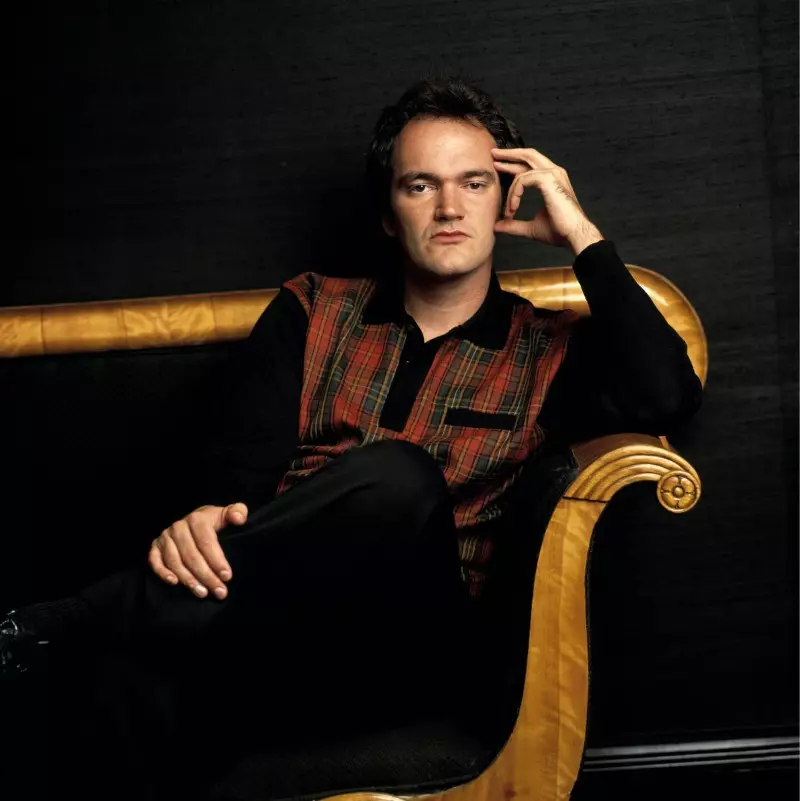
Personal story about criticism
In this photo, Quentin Tarantino and Steve Bushhemi rehearsed the scene from "Mad Pnights" at the Laboratory of Sandans in 1991.
Then Tarantino was another not known to the debutant who sold one scenario ("inborn killers") for the minimum amount that the guild of scriptwriters ($ 30,000) admitted. He intended to remove the "mad pieces" after many years of attempts to finish their first full-length film (he remained unfinished) and find funding for another full-length (not).

It can be assumed that the laboratory was an important step of Tarantino to his goal - the first (completed) full-length film.
In the 1994 documentary film Quentin Tarantino - Hollywood's Boy Wonder, where the young director, together with Terry Gilliam, recall the laboratory, tells a funny story, as Tarantino received directly opposite reviews about his work.
First reviews about Creativity Tarantino

Tarantino: I thought to experiment in the first scene, add long shots. I did not want to shoot a few traditional frames, instead I was going to glue a couple of long and see how everything worked. It was probably the first time when I had a camera in my hands, since I began to understand what I am doing.
Gillim: Quentin has experience with two groups of professionals. The previous group, whose names I will not call, responded to his work quite rigidly.
Tarantino: They did not like anything. In general, they left, and then they came others - Terry Gillyam, the walls of Donen, Folker Schlendorf and Robert Estin.
Gillim: By our group, Quentin really liked, because he was full of enthusiasm, with an incredible scenario, energetic and with excellent dialogues. He simply was bold. Therefore, it seems to me that the Sandens Lab is very useful: Quentin had a bunch of ideas and energy, a chance to show that he could. What he did in these little episodes. The camera was there and there, she never stopped. It was not possible at all that, but, in my opinion, for Quentin it was a useful experience. Now he knew how not to do.
Emotional comments and constructive comments

Emotional critics
The problem of the first group was that her comments were built on personal preferences.
They just did not like.
Such criticism is the most useless. (As well as a simple statement that you like something. Yes, it flatters the ego of the Creator, but this is all.) If your criticism is not aimed at helping the author better express what he wants to say, but rather similar For condemnation, you can harm him.
The other group provided Constructive criticism.
Sewing constructive criticism can also be unpleasant, but it helps the authors find solutions to existing problems and share knowledge.
Someone can say that such a critic has become possible because the members of the second group liked it, what did Tarantino, so they wanted to help the young director maintain his energy and at the same time teach to manage the camera. This is true, but not at all.
What you need to remember, asking for commenting his work

What you need to remember listening to criticism
It is necessary to ask ourselves, what kind of criticism do we get: emotional or constructive?If constructive, then you need to take into account any comment, whatever it is. Even if it is unpleasant, and you are going to ignore it for the sake of the project.
If you are dealing with emotional criticism, remember that she does not mean anything about your ability to tell stories, just your work has not found a response in man.
What you need to remember, criticizing someone else's creativity
Commenting on someone's work, you need to discard your feelings and try to use your skills, whatever they are to give constructive criticism. It may be tips, a new look at the problem, while you need to constantly remind that these are just offers that can be ignored (that is, our ego nothing to do with it).
It is difficult for everyone
It is difficult to be honest and give really useful comments. It is much easier to say that you liked what the author did, allocate some three good items from his work and forget about it.
It's hard to listen to criticism, even knowing that it is useful: somewhere in the depths of the soul you probably wanted to hear that everything is fine. Our duty is to help each other by offering constructive criticism, and to share your own work with those who can constructively criticize us.
A source
See also:
Selection of director: 8 favorite movies Guillermo del Toro
Scandals, intrigues, investigations and other spicy moments of the Oscar premium
5 Great Lizers: Do not envy their glory
